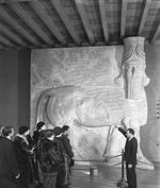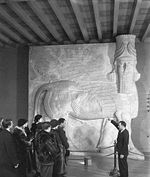
Edward Chiera
Encyclopedia
Edward Chiera was an Italian
-American
archaeologist, Assyriologist, and scholar of religions and linguistics.
Born in Rome, Italy, in 1885, Chiera trained as a theologian at the Crozer Theological Seminary
(B.D. 1911, Th.M. 1912). He completed his doctorate at the University of Pennsylvania
(Ph.D. 1913). He was faculty of the University of Pennsylvania until 1927, at which time he joined the Oriental Institute
of the University of Chicago
. Chiera was Annual Professor of the American Schools of Oriental Research
Chiera was Annual Professor of the American Schools of Oriental Research
(ASOR) at Baghdad
in 1924 – 1925. At that time he conducted archaeological excavations in ancient Nuzi
, near Kirkuk
, Iraq, at the invitation of Gertrude Bell
and sponsored by the Iraq Museum
. His discovery and deciphering of the Nuzi Tablets was an important archaeological result.
A pre-eminent scholar of ancient cuneiform
languages, Chiera became Editor of the Chicago Assyrian Dictionary
Project, a monumental work which had been started in 1921, and eventually took 85 years to complete. He was a close associate of the director and founder of the Oriental Institute,
James Henry Breasted. Chiera also acted as a curator of the Museum of the Oriental Institute, and made significant acquisitions for its collections, in addition to his own discoveries.
Chiera led Oriental Institute excavations at Khorsabad, near Mosul
, Iraq in 1928 - 1929, again with great success. The site of the ancient palace of King Sargon II
was excavated. Valuable works of Assyrian art were recovered, including a colossal Lamassu
which had guarded the entrance to the palace. He continued as Field Director of ASOR in 1931, in a joint expedition of ASOR and Harvard University
. He was instrumental in the development of plans for the ASOR, for the Iraq Museum, and in the careers of other noted archaeologists.
Italy
Italy , officially the Italian Republic languages]] under the European Charter for Regional or Minority Languages. In each of these, Italy's official name is as follows:;;;;;;;;), is a unitary parliamentary republic in South-Central Europe. To the north it borders France, Switzerland, Austria and...
-American
United States
The United States of America is a federal constitutional republic comprising fifty states and a federal district...
archaeologist, Assyriologist, and scholar of religions and linguistics.
Born in Rome, Italy, in 1885, Chiera trained as a theologian at the Crozer Theological Seminary
Crozer Theological Seminary
The Crozer Theological Seminary was a multi-denominational religious institution located in Upland, Pennsylvania. The school succeeded a Normal School established at the site and the building's use as a hospital during the American Civil War...
(B.D. 1911, Th.M. 1912). He completed his doctorate at the University of Pennsylvania
University of Pennsylvania
The University of Pennsylvania is a private, Ivy League university located in Philadelphia, Pennsylvania, United States. Penn is the fourth-oldest institution of higher education in the United States,Penn is the fourth-oldest using the founding dates claimed by each institution...
(Ph.D. 1913). He was faculty of the University of Pennsylvania until 1927, at which time he joined the Oriental Institute
Oriental Institute, Chicago
The Oriental Institute , established in 1919, is the University of Chicago's archeology museum and research center for ancient Near Eastern studies.- History and purpose:James Henry Breasted built up the collection of the Haskell Oriental Museum...
of the University of Chicago
University of Chicago
The University of Chicago is a private research university in Chicago, Illinois, USA. It was founded by the American Baptist Education Society with a donation from oil magnate and philanthropist John D. Rockefeller and incorporated in 1890...
.

American Schools of Oriental Research
The American Schools of Oriental Research, founded in 1900, supports and encourages the study of the peoples and cultures of the Near East, from the earliest times to the present. It is apolitical and has no religious affiliation...
(ASOR) at Baghdad
Baghdad
Baghdad is the capital of Iraq, as well as the coterminous Baghdad Governorate. The population of Baghdad in 2011 is approximately 7,216,040...
in 1924 – 1925. At that time he conducted archaeological excavations in ancient Nuzi
Nuzi
Nuzi was an ancient Mesopotamian city southwest of Kirkuk in modern Al Ta'amim Governorate of Iraq, located near the Tigris river...
, near Kirkuk
Kirkuk
Kirkuk is a city in Iraq and the capital of Kirkuk Governorate.It is located in the Iraqi governorate of Kirkuk, north of the capital, Baghdad...
, Iraq, at the invitation of Gertrude Bell
Gertrude Bell
Gertrude Margaret Lowthian Bell, CBE was an English writer, traveller, political officer, administrator, and archaeologist who explored, mapped, and became highly influential to British imperial policy-making due to her extensive travels in Greater Syria, Mesopotamia, Asia Minor, and Arabia. Along...
and sponsored by the Iraq Museum
National Museum of Iraq
The National Museum of Iraq is a museum located in Baghdad, Iraq. It contains precious relics from Mesopotamian civilization.-Foundation:...
. His discovery and deciphering of the Nuzi Tablets was an important archaeological result.
A pre-eminent scholar of ancient cuneiform
Cuneiform
Cuneiform can refer to:*Cuneiform script, an ancient writing system originating in Mesopotamia in the 4th millennium BC*Cuneiform , three bones in the human foot*Cuneiform Records, a music record label...
languages, Chiera became Editor of the Chicago Assyrian Dictionary
Chicago Assyrian Dictionary
The Chicago Assyrian Dictionary or The Assyrian Dictionary of the Oriental Institute of the University of Chicago is a nine-decade project at the University of Chicago's Oriental Institute to compile a dictionary of the Akkadian language and its dialects, focusing on the New-Assyrian forms...
Project, a monumental work which had been started in 1921, and eventually took 85 years to complete. He was a close associate of the director and founder of the Oriental Institute,
James Henry Breasted. Chiera also acted as a curator of the Museum of the Oriental Institute, and made significant acquisitions for its collections, in addition to his own discoveries.
Chiera led Oriental Institute excavations at Khorsabad, near Mosul
Mosul
Mosul , is a city in northern Iraq and the capital of the Ninawa Governorate, some northwest of Baghdad. The original city stands on the west bank of the Tigris River, opposite the ancient Assyrian city of Nineveh on the east bank, but the metropolitan area has now grown to encompass substantial...
, Iraq in 1928 - 1929, again with great success. The site of the ancient palace of King Sargon II
Sargon II
Sargon II was an Assyrian king. Sargon II became co-regent with Shalmaneser V in 722 BC, and became the sole ruler of the kingdom of Assyria in 722 BC after the death of Shalmaneser V. It is not clear whether he was the son of Tiglath-Pileser III or a usurper unrelated to the royal family...
was excavated. Valuable works of Assyrian art were recovered, including a colossal Lamassu
Lamassu
A Lamassu , is a protective deity, often depicted with a bull or lion's body, eagle's wings, and human's head. In some writings, it is portrayed to represent a female deity...
which had guarded the entrance to the palace. He continued as Field Director of ASOR in 1931, in a joint expedition of ASOR and Harvard University
Harvard University
Harvard University is a private Ivy League university located in Cambridge, Massachusetts, United States, established in 1636 by the Massachusetts legislature. Harvard is the oldest institution of higher learning in the United States and the first corporation chartered in the country...
. He was instrumental in the development of plans for the ASOR, for the Iraq Museum, and in the careers of other noted archaeologists.

